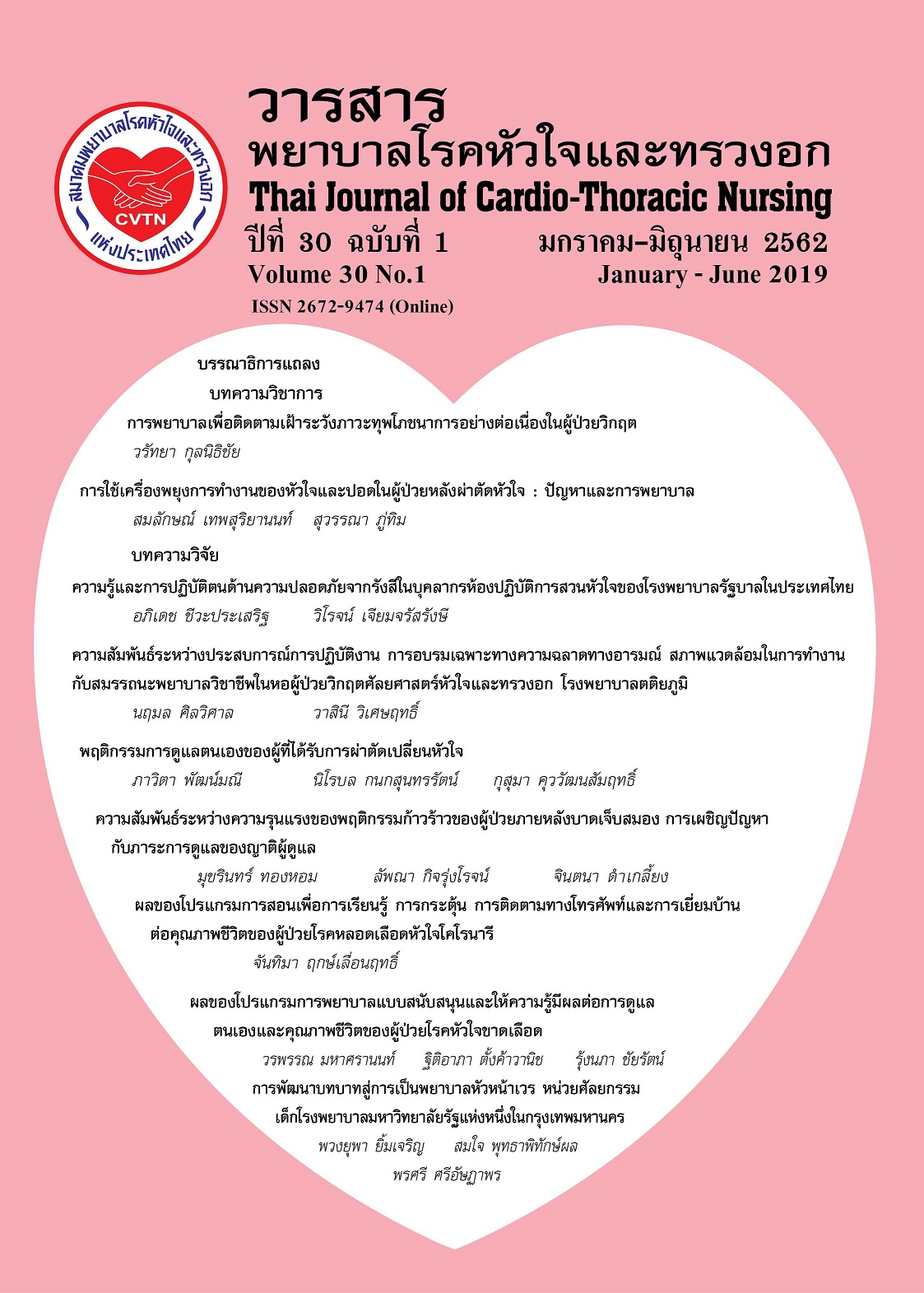Relationships between working experiences, educational training, emotional intelligence, working environment, and nurse competency in cardiothoracic surgical ward, the tertiary hospitals
Keywords:
competency, working experiences, educational training, emotional intelligence, working environment, cardiothoracic surgical wardAbstract
The purposes of this study were to study nurse competency, emotional intelligence, working environment in cardiothoracic ward, including to examine and to search for the variables which could predict nurse competency in cardiothoracic. The samples consisted of 125 professional nurses at cardiothoracic ward in seven tertiary hospitals. Data was collected using the questionnaires as: nurse competency, emotional intelligence, working environment. The data were analyzed by using mean, standard deviation, Chi-square, Pearson’s product moment correlation coefficient and stepwise multiple regression analysis.
The results were as follows: nurse competency in cardiothoracic surgical ward, emotional intelligence and working environment was at a high level (mean= 4.23, 4.01 and 4.17 respectively). Working experiences (r =.368), educational training (r= .315), emotional intelligence (r= .631) and working environment (r=.593) were positively related to nurse competency in cardiothoracic surgical ward (p<.05). Factor significantly predicted nurse competency in cardiothoracic surgical ward were working environment, emotional intelligence and working experiences at .05 level. These predictors were accounted for 53.3 percent (R2= .533).
The results of this study suggest that nurse administrator should develop guideline to promote nurses working at cardiothoracic surgical ward to improve their better competency,
References
2. The Society of Thoracic Surgeons of Thailand. Heart surgery in Thailand in 2015-2016 [document on the Internet]. 2016 [cited 2017 June 1]; 1-5 Available from: www.thaists. org/news_detail.phpnews id=212.
3. Jill L. Standards for resuscitation after cardiac surgery. Critical care nurse [Internet]. 2015 [cited 2016 May 1]; 35: 30-38. Available from: https://www.ncbi. nlm.nih.gov/pubmed /25834006.
4. Sara SF. Core competencies required for the cardiac surgical nurse practitioner. J Am Acad Nurse Pract. 2012; 24: 472–5.
5. Ratsanethamachot S. Human resource management competency-based HRM. 2nd. ed. Bangkok: Amarin Printing & Publishing; 2008. (in Thai).
6. Thailand Nursing and Midwifery Council. Competencies of registered nurses. 2nd. ed. Nonthaburi: Nursing Council, Thailand; 2013. (in Thai).
7. Benner P. From novice to expert: excellence and power in clinical nursing practice. California: Addison-Wesley; 1984.
8. Ratsanethamachot S. Human Resource development with competency based learning. Bangkok: Siriwatthana Inter-print; 2008. (in Thai).
9. Youwattana P. Relationships between personal factors, workplace environments, transformational leadership of head nurses, and transcultural nursing competencies of professional nurses private Hospitals Bangkok Metropolis. [Master Thesis of Nursing]. Bangkok: Chulalongkorn University; 2010. (in Thai).
10. Innong S. The development of cardiothoracic surgical nurse competency Siriraj Hospital. [Master Thesis of Nursing]. Bangkok: Chulalongkorn University; 2010. (in Thai).
11. Sanprasan P, Chamsomboon K, Wattaradul D. CVT Nursing standards: quality development concepts. In: Wattaradul D, editor. Bangkok: Sukhumvit printing; 2014. (in Thai).
12. McCormick, Ernest J, Daniel I. Industrial and organization psychology. Englewood cliffs: Prentice- Hall [Internet]. 1985 [cited 2016 May 3]; 1-5. Available from: https://www. pearson.com/us/higher-education/program/Mc-Cormick-Industrial-and-Organizational-Psychology-8th-Edition/PGM294568.
13. McClelland DC. Testing for competence rather than for "intelligence." Am Psychol.1973; 28(1): 1-14. https://dx.doi.org/10.1037/h0034092.
14. Canadian Nurses Association. Exam blueprint and specialty competencies [Internet]. 35. Canada. Cardiovascular nursing exam certification; 2013[2016 May 1]. Available from: https://www.nurseone. ca//media/nrseone/files/en/cert_cadio_2003_e.pdf.
15. Martha M. Core competencies for emergency cardiac care. Providence health care heart centre[Internet]. 2013 [cited 2016 May 3];1-5. Available from: www.heartcentre.ca/sites/
default/files/Core%20Competencies%20for%20Emergency%20Cardiac%20Care.pdf
16. Srithamrongsawat S. Full report project series advanced tertiary services (excellence center) under the universal health insurance system. [Internet]. 2013[cited 2016 June 22]. Available from: https://www.hisro.or.th/main/modules/research/attachservices/145 /Abstract.pdf.
17. Goleman, D. Emotional Intelligence; why it can matter more than IQ. New York: Bantam Books; 2002.
18. McKim, S.J. Healthy work environment. Nurse Lead. 2003; 15: 15-22.
19. Wiratchai N. Guideline of statistic. 2nd edition. Bangkok: Icon printing; 2012. (in Thai).
20. Department of Mental Health, Ministry of Public Health. Research report on emotional intelligence development for Thai people aged 12-60 years. Nonthaburi: Kamol Productions printing; 2011. (in Thai).
21. Kannasut P. Statistics for behavioral research. 3 nd. ed. Bangkok: Chulalongkorn printing; 2012. (in Thai).
22. Council of Nursing. Strategic plan for nursing council 2012 - 2016. 2nd, ed. Nonthaburi: Jutthong printing; 2011. (in Thai).
23. Salovey P, Mayer JD. What is your emotional intelligence? In: Salovey P, Sluyter DJ, editors. Emotional development and emotion intelligence: educational implications. New York: Basic Books; 1997.
24. Wexley KN, Latham GP. Developing and training human resources in organization. New York: HarperCollins; 1991.
25. The America Association of Critical – Care Nurse. AACN Standards for establishing and sustaining healthy work environment: a journey to excellence. Am J Crit Care. 2005; 14:
187-97.
Downloads
Published
How to Cite
Issue
Section
License
บทความนี้ยังไม่เคยตีพิมพ์หรืออยู่ในระหว่างส่งไปตีพิมพ์ในวารสารอื่น ๆ มาก่อน และกองบรรณาธิการขอสงวนสิทธิ์ในการตรวจทาน และแก้ไขต้นฉบับตามเกณฑ์ของวารสาร ในกรณีที่เรื่องของท่านได้ได้รับการตีพิมพ์ในวารสารฉบับนี้ถือว่าเป็น ลิขสิทธิ์ของวารสารพยาบาลโรคหัวใจและทรวงอก






